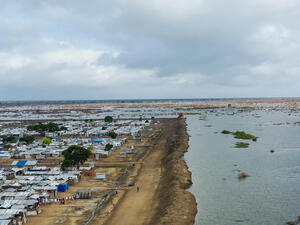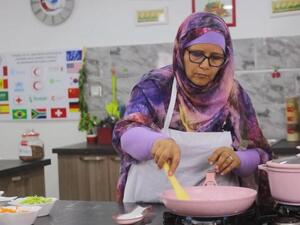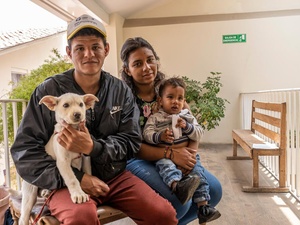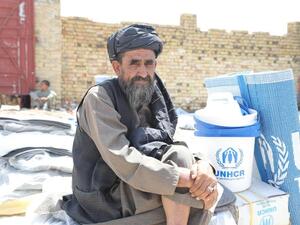Chad: weather conditions worsening, urgent action needed to combat malnutrition among refugees
Chad: weather conditions worsening, urgent action needed to combat malnutrition among refugees
Torrential rains, sandstorms and strong winds are worsening the problems of Sudanese refugees in Chad and hampering the relief effort. Heavy rains in north-eastern Chad have driven refugees out of their makeshift shelters in the seasonal riverbeds (wadis) and UNHCR is now transferring them to safer surroundings in a new camp. On Wednesday, the first heavy rains started falling around the border town of Bahai, where some 15,000 Sudanese refugees are encamped along the wadis - flooding the river beds and forcing refugees out of their encampments. Many had to walk through the water to drier spots, carrying their belongings on their heads. We have relocated the families whose shelters were flooded to our new camp at Oure Cassoni, which opened on Monday.
A sandstorm also struck Bahai on Wednesday, temporarily slowing down convoys to the camp because of poor visibility. Strong winds at Oure Cassoni blew away 65 tents that were re-erected promptly by the International Rescue Committee (IRC), which manages the camp. Rains continued on Thursday in the northern stretch of the refugee-hosting border zone, and we are racing to move the refugees from Bahai to the new camp on twice daily convoys transporting up to 1,000 people per day. So far, 3,353 refugees have been moved to Oure Cassoni camp.
The rains set in more than a month ago in the southern part of the affected border zone and in recent weeks they are also cutting off roads and slowing the relief effort in the central section of the affected region around Adré and Abéché.
In all, more than 127,000 refugees have moved from the border to UNHCR's nine camps in eastern Chad, while another estimated 7,000 have made their own way from the border to the site of Am Nabak where they are receiving assistance.
Urgent action needed to combat malnutrition among refugees in north-eastern Chad
Meanwhile, initial findings of a nutrition survey coordinated by UNHCR underscore the need for emergency action to combat high levels of malnutrition among Sudanese refugees in north-eastern Chad, particularly children under five years old. The survey was a joint, interagency effort by UNHCR, the US Centers for Disease Control and Prevention (CDC), UNICEF, WHO, WFP, the Centre National de Nutrition et Technique Alimentaire, MSF Belgium, IMC [International Medical Corps], IRC [International Rescue Committee] and the Chadian Ministry of Health.
The survey focused on three of the eight refugee camps in north-eastern Chad (a ninth camp has since been opened), as well as on the Bahai area at the Chad-Sudan border where refugees had not yet been moved into camps. The camps selected were those thought to have the most serious malnutrition problems in the region. Local Chadians in the surrounding villages were also included in the survey.
The survey found global acute malnutrition levels indicating a serious crisis, with 36 to 39 percent of refugee children under five malnourished. High levels (35 percent) of malnutrition were also found among the local Chadian population. The survey also found low levels of measles immunization among refugees at the border and high rates of diarrhoeal disease. The survey team concluded that without immediate corrective action, the combination of these factors may lead to increases in serious illness and death.
Since mid-June when the survey data were collected, progress has already been made on several fronts to improve the situation. Water supply in the camps has been improved, and in all three camps surveyed sufficient clean water is now available. A new camp opened this week for the refugees still along the border in Bahai, and more than 3,000 have been relocated and provided shelter in just the first four days of operations. A measles vaccination campaign has also now been completed in Bahai and in nearby Cariari.
But much more urgent action is still needed. UNHCR is deploying an additional nutritionist and a senior health coordinator to the area and is working to find additional non-governmental partners to work on health and nutrition. UNHCR will also be working closely with the World Food Programme to advocate for improved general food rations and additional food commodities for selective feeding programmes for all vulnerable refugees. We also plan to urgently purchase food commodities to fill the immediate gap for supplemental and therapeutic feeding for the refugees. A high-level meeting is scheduled for next week between UNHCR and WFP and will address this critical situation.
The final report on the survey is still being completed, but initial recommendations call for the immediate implementation of a blanket supplementary feeding programme for all children under 5 years old and pregnant and lactating women, and expanded selective feeding programmes for malnourished children. Improvements are also needed in the general food ration provided to all refugees by the World Food Programme. The survey also recommends improving the quantity and quality of water available for the refugees, a longstanding challenge in the arid desert of eastern Chad where the refugees have fled from fighting in their home villages in Darfur.
While the survey was not designed to focus on the causes of the malnutrition, the experts involved in the survey note that there are many contributing factors, in addition to inadequate food rations. High levels of diarrhoea, insufficient availability of water, and the overall lack of public health infrastructure in this remote and isolated region can all exacerbate the degree of malnutrition. In light of this multitude of contributing factors, the survey team stresses that the response to this crisis must integrate all public health and nutrition sectors, and cover food, water, medical care and shelter simultaneously.









